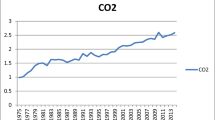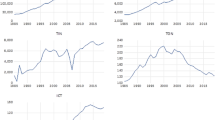Abstract
This study examines the impact of industrial structure on carbon dioxide (CO2) emissions with emphasis on the activities of secondary and tertiary industries and the role of information and communication technologies and economic freedom. We focus on explaining consumption-based and territorial-based CO2 emissions in a selection of African economies over the period 1995–2017, accounting for possible heterogeneity in the distribution of both measures of CO2 emissions using the Method of Moments Quantile Regression approach for handling fixed effects in panel quantile models. The results show that (i) industrial output increase territorial-based CO2 emissions and have stronger impact in countries with more extractive industries; (ii) services reduce consumption-based CO2 emissions and the impact is significant across the entire quantile distribution; (iii) the use of fixed (wired) and analogue telephone technologies increases consumption-based and territorial-based CO2 emissions and the impact is stronger at the upper quantile distribution; (iv) the use of mobile telephone and internet technologies reduces consumption-based and territorial-based CO2 emissions and the impact is stronger at the upper quantile distribution; (v) increased economic freedom decreases territorial-based CO2 emissions and the impact is stronger at the upper quantile distribution. Overall, our findings highlight the role of mobile telephone and internet penetration, restructuring towards service-based economy and economic freedom in promoting cleaner production and sustainable consumption patterns in African economies.


Similar content being viewed by others
References
Altinoz, B., Vasbieva, D., & Kalugina, O. (2020). The effect of information and communication technologies and total factor productivity on CO2 emissions in top 10 emerging market economies. Environmental Science and Pollution Research. https://doi.org/10.1007/s11356-020-11630-1
Asongu, S. A., Le Roux, S., & Biekpe, N. (2018). Enhancing ICT for environmental sustainability in sub-Saharan Africa. Technological Forecasting and Social Change, 127, 209–216.
Atikian, J. (2013). Industrial shift: The structure of the new world economy. Palgrave Macmillan. https://doi.org/10.1057/9781137340313
Audu, A., Jimoh, A., Abdulkareem, S. A., & Lawrence, O. (2016). Economics and environmental impacts of oil exploration and exploitation in Nigeria. Energy Sources, Part b: Economics, Planning, and Policy, 11(3), 251–257.
Avom, D., Nkengfack, H., Fotio, H. K., & Totouom, A. (2020). ICT and environmental quality in Sub-Saharan Africa: Effects and transmission channels. Technological Forecasting and Social Change, 155, 120028.
Belkhir, L., & Elmeligi, A. (2018). Assessing ICT global emissions footprint: Trends to 2040 & recommendations. Journal of Cleaner Production, 177, 448–463.
Breitung, J. (2000). The local power of some unit root tests for panel data. In B. H. Baltag (Ed.), Advances in econometrics Nonstationary Panels, Panel Cointegration, and Dynamic Panels i (Vol. 15, pp. 161–178). Amsterdam: JAI Press.
Breitung, J., & Das, S. (2005). Panel unit root tests under cross-sectional dependence. Statistica Neerlandica, 59, 414–433.
Canay, I. A. (2011). A simple approach to quantile regression for panel data. The Econometrics Journal, 14(3), 368–386.
Carlsson, F.& Lundström, S. (2003). The effects of economic and political freedom on CO2 emissions. Working Papers in Economics, 29, University of Gothenburg, Department of Economics.
Dietz, T., & Rosa, E. A. (1994). Rethinking the environmental impacts of population, affluence and technology. Human Ecology Review, 1(2), 277–300.
Dietz, T., Rosa, E. A., & York, R. (2007). Driving the human ecological footprint. Frontiers in Ecology and the Environment, 5(1), 13–18.
Driscoll, J. C., & Kraay, A. C. (1998). Consistent covariance matrix estimation with spatially dependent panel data. Review of Economics and Statistics, 80, 549–560.
Edwards, D. P., Sloan, S., Weng, L., Dirks, P., Sayer, J., & Laurance, W. F. (2014). Mining and the African environment. Conservation Letters, 7(3), 302–311.
Fayiga, A. O., Ipinmoroti, M. O., & Chirenje, T. (2018). Environmental pollution in Africa. Environment, Development and Sustainability, 20(1), 41–73.
Friedlingstein, P., Jones, M. W., O’Sullivan, M., Andrew, R. M., Hauck, J., et al. (2019). Global carbon budget 2019. Earth System Science Data, 11(4), 1783–1838. https://doi.org/10.5194/essd-11-1783-2019
Fuchs, C. (2008). The implications of new information and communication technologies for sustainability. Environment, Development and Sustainability, 10(3), 291–309.
Galvao, A. F., Jr. (2011). Quantile regression for dynamic panel data with fixed effects. Journal of Econometrics, 164(1), 142–157.
Gouvea, R., Kapelianis, D., & Kassicieh, S. (2018). Assessing the nexus of sustainability and information & communications technology. Technological Forecasting and Social Change, 130, 39–44.
Graafland, J. (2019). Economic freedom and corporate environmental responsibility: The role of small government and freedom from government regulation. Journal of Cleaner Production, 218, 250–258.
Graafland, J. (2020). When does economic freedom promote well being? On the moderating role of long-term orientation. Social Indicators Research, 149(1), 127–153.
Green, S., Melnyk, A., & Powers, D. (2002). Is economic freedom necessary for technology diffusion? Applied Economics Letters, 9(14), 907–910.
Hartwell, C. A., & Coursey, D. L. (2015). Revisiting the environmental rewards of economic freedom. Economics and Business Letters, 4(1), 36–50.
Hashmi, S. H., Hongzhong, F., Fareed, Z., & Bannya, R. (2020). Testing non-linear nexus between service sector and CO2 emissions in Pakistan. Energies, 13(3), 526.
Higón, D. A., Gholami, R., & Shirazi, F. (2017). ICT and environmental sustainability: A global perspective. Telematics and Informatics, 34(4), 85–95.
Houghton, J.W. (2010). ICT and the environment in developing countries: A review of opportunities and developments. In What kind of information society? Governance, virtuality, surveillance, sustainability, resilience (pp. 236–247). Heidelberg: SpringerBerlin.
Huisingh, D., Zhang, Z., Moore, J. C., Qiao, Q., & Li, Q. (2015). Recent advances in carbon emissions reduction: Policies, technologies, monitoring, assessment and modeling. Journal of Cleaner Production, 103, 1–12.
Jacob, P. (2018). Information and communication technology in shaping urban low carbon development pathways. Current Opinion in Environmental Sustainability, 30, 133–137.
Jebli, M. B., Farhani, S., & Guesmi, K. (2020). Renewable energy, CO2 emissions and value added: Empirical evidence from countries with different income levels. Structural Change and Economic Dynamics, 53, 402–410. https://doi.org/10.1016/j.strueco.2019.12.009
Joshi, P., & Beck, K. (2018). Democracy and carbon dioxide emissions: Assessing the interactions of political and economic freedom and the environmental Kuznets curve. Energy Research & Social Science, 39, 46–54.
Joshua, U., & Alola, A. A. (2020). Accounting for environmental sustainability from coal-led growth in South Africa: The role of employment and FDI. Environmental Science and Pollution Research, 27, 17706–17716.
Kao, C. (1999). Spurious regression and residual-based tests for cointegration in panel data. Journal of Econometrics, 90, 1–44.
Kouton, J., Bétila, R. R., & Lawin, M. (2020). The impact of ICT development on health outcomes in Africa: Does economic freedom matter? Journal of the Knowledge Economy, 12(4), 1–40. https://doi.org/10.1007/s13132-020-00689-3
Kreps (2020). Global digital overview essential insights into how people around the world use the internet, mobile devices, social media, and ecommerce. https://wearesocial-net.s3-eu-west-1.amazonaws.com/wp-content/uploads/common/reports/digital-2020/digital-2020-global.pdf.
Lampert, A. (2019). Over-exploitation of natural resources is followed by inevitable declines in economic growth and discount rate. Nature Communications, 10(1), 1–10.
Li, Z., Shao, S., Shi, X., Sun, Y., & Zhang, X. (2019). Structural transformation of manufacturing, natural resource dependence, and carbon emissions reduction: Evidence of a threshold effect from China. Journal of Cleaner Production, 206, 920–927.
Lu, W. C. (2018). The impacts of information and communication technology, energy consumption, financial development, and economic growth on carbon dioxide emissions in 12 Asian countries. Mitigation and Adaptation Strategies for Global Change, 23(8), 1351–1365.
Machado, J. A. F., & Santos Silva, J. M. C. (2019). Quantiles via moments. Journal of Econometrics, 213, 145–173.
Mahmood, H., Alkhateeb, T. T. Y., & Furqan, M. (2020). Industrialization, urbanization and CO2 emissions in Saudi Arabia: Asymmetry analysis. Energy Reports, 6, 1553–1560.
Miller, T., Kim, A.B. & Roberts, J.M. (2020). 2020 index of Economic Freedom. https://www.heritage.org/index/pdf/2020/book/index_2020.pdf.
Murshed, M., Nurmakhanova, M., Elheddad, M., & Ahmed, R. (2020). Value addition in the services sector and its heterogeneous impacts on CO2 emissions: Revisiting the EKC hypothesis for the OPEC using panel spatial estimation techniques. Environmental Science and Pollution Research, 27(31), 38951–38973.
Nguyen, T. T., Pham, T. A. T., & Tram, H. T. X. (2020). Role of information and communication technologies and innovation in driving carbon emissions and economic growth in selected G-20 countries. Journal of Environmental Management, 261, 110162.
Okamoto, S. (2013). Impacts of growth of a service economy on CO 2 emissions: Japan’s case. Journal of Economic Structures, 2(1), 8.
Opoku, E. E. O., & Boachie, M. K. (2020). The environmental impact of industrialization and foreign direct investment. Energy Policy, 137, 111178.
Ozcan, B., & Apergis, N. (2018). The impact of internet use on air pollution: Evidence from emerging countries. Environmental Science and Pollution Research, 25(5), 4174–4189.
Pandey, S., Dogan, E., & Taskin, D. (2020). Production-based and consumption-based approaches for the energy-growth-environment nexus: Evidence from Asian countries. Sustainable Production and Consumption, 23, 274–281.
Pedroni, P. (1999). Critical values for cointegration tests in heterogeneous panels with multiple regressors. Oxford Bulletin of Economics and Statistics, 61, 653–670.
Pedroni, P. (2004). Panel cointegration: Asymptotic and finite sample properties of pooled time series tests with an application to the PPP hypothesis. Econometric Theory, 20, 597–625.
Pesaran, M. H. (2003). a simple panel unit root test in the presence of cross section dependence. Cambridge Working Papers in Economics 0346, Faculty of Economics (DAE), University of Cambridge.
Pesaran, M. H. (2007). A simple panel unit root test in the presence of cross-section dependence. Journal of Applied Econometrics, 22, 265–312.
Peters, G.P., Minx, J.C., Weber, C.L. & Edenhofer, O. (2011). Growth in emission transfers via international trade from 1990 to 2008. Proceedings of the National Academy of Sciences. 108, 8903–8908. http://www.pnas.org/content/108/21/8903.
Pham, N. M., Huynh, T. L. D., & Nasir, M. A. (2020). Environmental consequences of population, affluence and technological progress for European countries: A Malthusian view. Journal of Environmental Management, 260, 110143.
Sajeev, A., & Kaur, S. (2020). Environmental sustainability, trade and economic growth in India: Implications for public policy. International Trade, Politics and Development, 4(2), 141–160.
Sabuj, S. U., Ali, S. M., Hasan, K. W., & Paul, S. K. (2020). Contextual relationships among key factors related to environmental sustainability: Evidence from an emerging economy. Sustainable Production and Consumption, 27, 86–99.
Safi, A., Chen, Y., Wahab, S., Ali, S., Yi, X., & Imran, M. (2021). Financial instability and consumption-based carbon emission in E-7 countries: The role of trade and economic growth. Sustainable Production and Consumption, 27, 383–391.
Ulucak, R., & Kahn, S.U.-D. (2020). Does information and communication technology affect CO2 mitigation under the pathway of sustainable development during the mode of globalization? Sustainable Development, 28, 857–867. https://doi.org/10.1002/sd.2041
Wang, R., Zheng, X., Wang, H., & Shan, Y. (2019). Emission drivers of cities at different industrialization phases in China. Journal of Environmental Management, 250, 109494.
Wang, Z., Rasool, Y., Zhang, B., Ahmed, Z., & Wang, B. (2020). Dynamic linkage among industrialisation, urbanisation, and CO2 emissions in APEC realms: Evidence based on DSUR estimation. Structural Change and Economic Dynamics, 52, 382–389.
World Bank. (2022). World development indicators. https://databank.worldbank.org/home.aspx. Accessed 25 Jan 2022.
York, R., Rosa, E. A., & Dietz, T. (2003). STIRPAT, IPAT and ImPACT: Analytic tools for unpacking the driving forces of environmental impacts. Ecological Economics, 46(3), 351–365.
ZhangWang Latif, J. B. Z. (2019). Towards cross-regional sustainable development: The nexus between information and communication technology, energy consumption, and CO 2 emissions. Sustainable Development, 27(5), 990–1000.
Zheng, X., Wang, R., & Du, Q. (2020). How does industrial restructuring influence carbon emissions: City-level evidence from China. Journal of Environmental Management, 276, 111093.
Ziemba, E. (2019). The contribution of ICT adoption to the sustainable information society. Journal of Computer Information Systems, 59(2), 116–126.
Acknowledgements
Author gratitude is extended to the prospective editor(s) and reviewers that will/have spared time to guide towards a successful publication.
Funding
I hereby declare that there is no form of funding received for this study.
Author information
Authors and Affiliations
Corresponding author
Ethics declarations
Conflict of interest
All authors declare that they have no conflict of interest.
Additional information
Publisher's Note
Springer Nature remains neutral with regard to jurisdictional claims in published maps and institutional affiliations.
Rights and permissions
About this article
Cite this article
Nwani, C., Bekun, F.V., Agboola, P.O. et al. Industrial output, services and carbon emissions: the role of information and communication technologies and economic freedom in Africa. Environ Dev Sustain 25, 3299–3322 (2023). https://doi.org/10.1007/s10668-022-02183-z
Received:
Accepted:
Published:
Issue Date:
DOI: https://doi.org/10.1007/s10668-022-02183-z




